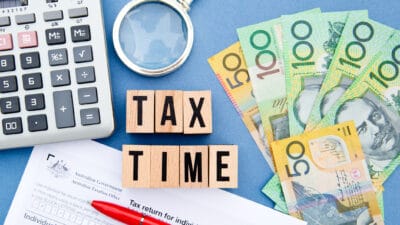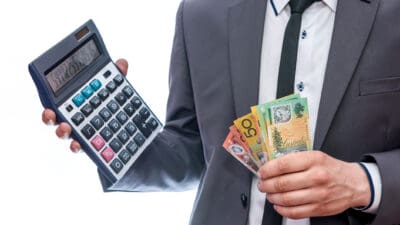Have you invested in cryptos like Bitcoin (CRYPTO: BTC), Ethereum (CRYPTO: ETH) or any of the wide range of altcoins over the course of the 2021-2022 financial year?
If so, the Australian Taxation Office will want the details come tax filing time.
Here's this guidepost from the ATO website:
If you are involved in acquiring or disposing of cryptocurrency, you need to be aware of the tax consequences. These vary depending on the nature of your circumstances.
Everybody involved in acquiring or disposing of cryptocurrency needs to keep records in relation to their cryptocurrency transactions.
If you have transacted with a foreign cryptocurrency exchange you may have tax responsibilities in another country.
With more than a million Aussies estimated to have invested in cryptos over the past year, The Motley Fool reached out to Mark Chapman, director of tax communications at H&R Block Australia, for some handy tips in how to sort out your crypto related tax details.
How to pay taxes on your investments in cryptos
"Capital Gains Tax (CGT) applies on gains arising from investment in crypto currency," Chapman informed us.
This is calculated based on the difference between the amount you paid for the cryptocurrency and the amount you disposed of it for. Any profit is subject to CGT, which can potentially be discounted by 50% if you hold your crypto asset for more than 12 months.
He said that the ATO considers disposal of your crypto investment to occur when:
- selling cryptocurrency for Australian dollars
- exchanging one cryptocurrency for another
- gifting cryptocurrency
- trading cryptocurrency
- using cryptocurrency to pay for goods or services
"In some cases, such as when you gift it, market value is substituted for proceeds," he added.
Are you a crypto investor or trader?
Chapman said that it makes a difference to the ATO whether you're classified as an investor in cryptos or a crypto trader:
If you buy and sell cryptocurrency on a regular basis with a view to making a profit, then the profits on disposal of the cryptocurrency will not be subject to CGT but will be assessable income since you will be regarded as a trader rather than an investor. In effect, you'll be regarded as being in business as a buyer/seller of cryptocurrency.
He admitted the distinction between the two can "be a fine line":
Broadly speaking if you are turning over your cryptocurrency every few days chasing profits, you have many transactions and you are running a business-like structure (with for example a business plan, accounts and records of trading stock, business premises, licences or qualifications, a registered business name and an Australian business number), you will be a trader.
If you are holding the cryptocurrency with a view to long term gain, you are likely to be an investor.
He said that for people classified as traders, the sales and purchases of cryptos are converted to Aussie dollars at the date the transactions are paid. "You must also apply the trading stock rules to determine if there is any income or deduction due to the changing value of your trading stock."
Is there a way to sell without paying taxes?
We'd never advocate any kind of tax avoidance. But we had to ask about any legal means to avoid or minimise taxes on crypto sales.
Chapman largely threw cold water on that idea.
"In most cases, no," he said. Chapman continued:
Some taxpayers mistakenly think that you can buy up to $10,000 of cryptocurrency and avoid CGT by taking advantage of the personal use exemption.
This exemption only applies where the cost of the cryptocurrency does not exceed $10,000 and you can demonstrate that the cryptocurrency was to fund genuine personal consumption, such as paying for a holiday, a car, your wedding, etc.
Mistakenly relying on this exemption is one of the biggest reasons people fall foul of the ATO. Expect to be asked to provide proof that you either did – or intended to – use your cryptocurrency to fund personal spending on goods and services.
Where the cost of your cryptocurrency assets exceeds $10,000, the personal use exemption will not be available and CGT will apply, whether the asset was for personal use or not.
What should you do before the end of the financial year?
With the end of the financial year closing in, we asked Chapman how crypto investors should prepare themselves today. According to Chapman:
Usually, you must pay tax on any profits/gains arising in a tax year after you lodge your tax return for that year. If you lodge yourself, your tax return must be sent to the ATO by 31 October 2022. If you use a tax agent, the lodgement date may be as late as 15 May 2023.
When it comes to your crypto investments, he advised that you keep good records regarding:
- the date of the transactions
- the value of the cryptocurrency in Australian dollars at the time of the transaction
- what the transaction was for and who the other party was (even if it's just their cryptocurrency address).
He advised keeping records, including:
- receipts of purchase or transfer of cryptocurrency
- exchange records
- records of agent, accountants and legal costs
- digital wallet records and keys
- software costs related to managing your tax affairs.
And you'll want to hold onto these records for 5 years from the time you lodge your tax return.
Unless you're a tax whiz and understand all the complexities involved around cryptos, you'll want to strongly consider getting with a tax agent who's atop digital assets.
H&R Block, for example, uses CryptoTaxCalculator.
Chapman told us this software program "is able to consolidate all digital transactions across multiple wallets, to calculate capital gains and losses of the previous year, and what your tax on each trade may be".
Happy crypto investing!








